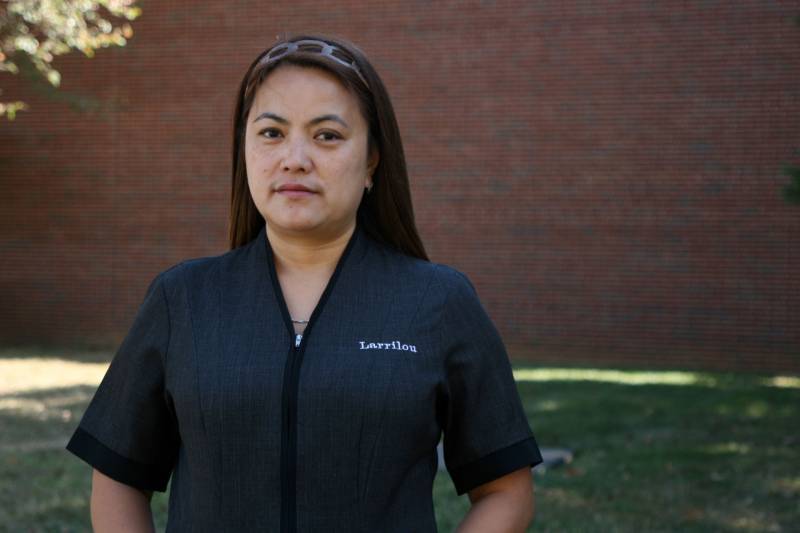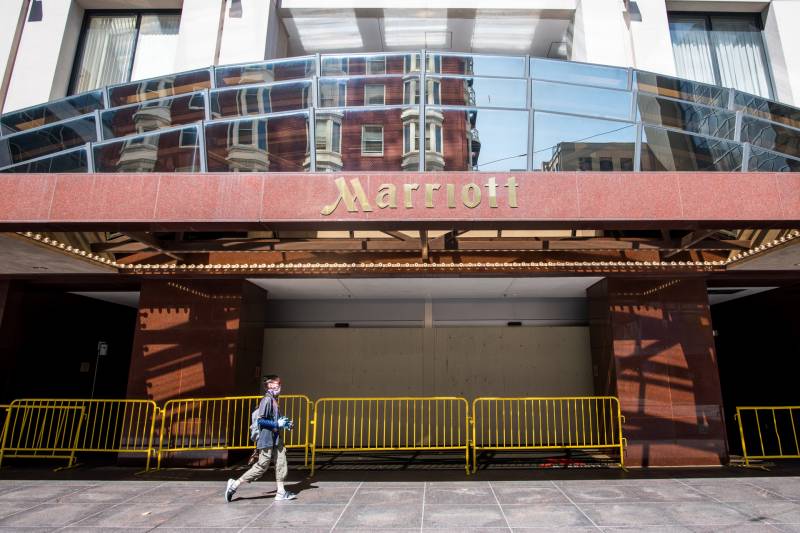If you’ve ever looked at San Francisco’s skyline, you’ve probably seen the Marriott Marquis, a luxury hotel located downtown. And if you’ve been inside one of the 1,362 rooms or 138 suites on the building’s 39 floors, you’ve probably encountered something that has been cleaned by Larrilou Carumba.
Carumba has worked as a housekeeper at the Marriott Marquis for eight years. She estimates that she’s changed tens of thousands of beds and folded hundreds of thousands of towels. But because of the coronavirus pandemic, she has been without work now for a month and a half — and counting.
The lack of income has been hard. Carumba is a single mom with three kids. She said she's spent the last two years saving tips and taking on extra shifts to pay off $35,000 in credit card debt from a toxic relationship that she escaped. Carumba was getting close to debt free, she said, until last year, when her landlord raised the rent by $800 a month.

Carumba couldn’t pay, so she moved her family into a room in her sister’s home. She took on more shifts, changed more beds, folded more towels and put away more money. At the end of February, she finally thought she had enough money to move out of her sister’s place.
But then the coronavirus hit, and for now, she’s stuck. There are nine of them in the house, including Carumba's 88-year-old mother.
Carumba chips in for rent and utilities, but she said the one-floor bungalow is crowded, especially now with the pandemic.
“I don’t want them to feel that they are burdened because of the four of us, but usually we are just hanging in the room,” she said.
Like tens of thousands of other workers that Marriott furloughed, Carumba is not getting paid by her employer. Instead, she said she’s collecting state unemployment and getting a little help from her kids’ school in the form of milk and PB&J sandwiches.
She said her kids are sad to be stuck inside all day.
“I tell them just to pray and just let’s hope this will end soon,” she said.

Corporate Philosophy Focused on Shareholder Profit
Carumba’s employer, Marriott International, and its investors have done very well in recent years. Like many major hotel chains, it has used its profits to buy back its own stocks and enrich investors with dividends. As the world’s largest hotel chain, it has sent the most money back to investors and over the last decade, funneled $16 billion into stock buybacks, according to Statista and S&P Global Marketing Intelligence.
In 1997, members of the Business Roundtable, an association comprising chief executives from major corporations, signed a declaration that said the primary duty of executives was to look out for shareholders — a logic that CEOs had been following for decades. Chicago economist Milton Friedman summed it up with a famous line published in the New York Times in 1970 when he wrote, “The social responsibility of business is to increase its profits.”
Late last summer, however, the Business Roundtable promised a shift in corporate philosophy. It issued a pledge signed by 181 CEOs from America's largest companies, saying executives should be concerned not just with shareholder profits but also with workers and the local community.
“Each of our stakeholders is essential,” the pledge said in part.
Marriott CEO Arne Sorenson was one of the executives who signed the pledge. Then, in February, the COVID-19 pandemic hit and put his promise to the test.

